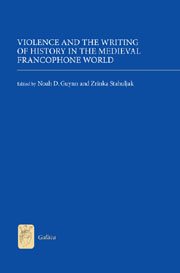Book contents
- Frontmatter
- Contents
- List of Illustrations
- List of Contributors
- Acknowledgments
- Introduction
- 1 Historicity, Violence, and the Medieval Francophone World: Mémoire Hystérisée
- Part I Theorizing Violence
- 2 Violence, History, and the Old French Epic of Revolt
- 3 Rhetoric, Providence, and Violence in Villehardouin's La conquête de Constantinople
- Part II Institutions and Subversions
- Part III Gender and Sexuality
- Part IV Trauma, Memory, and Healing
- Index
- Already Published
2 - Violence, History, and the Old French Epic of Revolt
from Part I - Theorizing Violence
Published online by Cambridge University Press: 05 April 2013
- Frontmatter
- Contents
- List of Illustrations
- List of Contributors
- Acknowledgments
- Introduction
- 1 Historicity, Violence, and the Medieval Francophone World: Mémoire Hystérisée
- Part I Theorizing Violence
- 2 Violence, History, and the Old French Epic of Revolt
- 3 Rhetoric, Providence, and Violence in Villehardouin's La conquête de Constantinople
- Part II Institutions and Subversions
- Part III Gender and Sexuality
- Part IV Trauma, Memory, and Healing
- Index
- Already Published
Summary
A number of scholars of literature, history, and anthropology have recognized that the old distinction made by Marcel Mauss and Claude Lévi-Strauss between gift giving and violence is no longer tenable.1 Lévi-Strauss suggested that the opposition between gift and violence was largely homologous with the opposition between friend and enemy. More recently, however, scholars have noted that gift giving often includes highly aggressive elements, while violence can be a socially constrained and regulated tactic that can be understood as a form of reciprocity that is not always dissimilar from the reciprocity of gift giving.
At the same time, it has also been recognized that both forms of reciprocity need to be understood in the light of a concept of the sacred. In particular, practices of socially regulated reciprocity – giving and violent taking – can only be fully understood if analyzed in relation to certain sacred “kept” items that individuals and groups seek to keep out of circulation, such as the ceremonial Sacred Pipe of certain Native American tribes or relics held by medieval churches and monasteries.3 These kept items are essential to the authority, legitimacy, or identity of the possessor. Within the realm of Mediterranean studies, the same argument is made using the terms “honor” (associated with both gifts and violence) and “grace” (associated with the sacred). The pursuit of honor can only be understood – and controlled – within the framework of grace.
- Type
- Chapter
- Information
- Publisher: Boydell & BrewerPrint publication year: 2013

